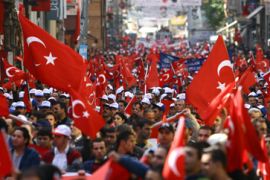Iraq to help Turkey against PKK
Pledge comes as funerals of 12 soldiers provoke huge anti-PKK protests in Turkey.

 |
| The coffin of Vedat Kutluca, who was killed by Kurdish rebels, is carried by gendarmes [AFP] |
Iraq has pledged to help Turkey in its attempt to tackle fighters from the Kurdistan Workers’ party (PKK) who are based in northern Iraq.
The pledge from Baghdad came as tens of thousands of angry Turks took to the streets across the country to protest violence from Kurdish rebels and as 12 soldiers, killed in an attack at the weekend, were laid to rest.
The funerals on Tuesday turned into seas of red and white as crowds of mourners marched waving the national flag.
| In depth |
Slogans were shouted against the PKK, whose fighters ambushed a military unit near the Iraqi border on Sunday.
“Hang Apo,” demonstrators chanted in the town of Keksin, referring to the nickname of the jailed leader of the PKK, Abdullah Ocalan.
A procession of about 7,000 people, about a fifth of the town’s population, marched behind the casket of one of the dead soldiers.
Traffic was at a standstill in centre of the northwest city of Bursa as demonstrators thronged the main boulevard.
Media ban
They carried huge Turkish flags and portraits of soldiers killed by the PKK in its 23-year campaign for Kurdish self-rule in the southeast.
Government and military officials attended the funeral ceremonies, held in 11 provinces across the country.
There were also demonstrations aginst the PKK in other cities.
As newspapers reported clashes between pro and anti-PKK students and other sporadic acts of violence, Turkish President Abdullah Gul appealed for public calm and restraint.
“However great the destruction caused by terrorism, the struggle against terrorism can be waged by legal means and only by the state,” Gul said in a statement.
The government, keen to avoid further inflaming public opinion, imposed a ban on all media broadcasts concerning the deaths of the 12 soldiers, whose pictures and life stories have featured prominently in the newspapers.
|
Your Views |
|
“I think it is pretty difficult to say troops shouldn’t [invade] when the Turkish soldiers are being killed, and their villages attacked” Celtic, Karlstad, Sweden |
RTUK, the state body that oversees television and radio in Turkey, said the ban was necessary because broadcasting news about the deaths “hurts the psychology of society and public order and creates an image of the security forces as weak”.
Until the ban, television channels had led news bulletins with footage of grieving wives, mothers, fathers and children.
Iraqi offer
In Baghdad Zebari assured his Turkish counterpart “that the Iraqi government will actively help Turkey to overcome this menace”.
Babacan said that “politics, dialogue, diplomacy, culture and economy” were the measures to deal with the current conflict.
He is expected to meet Nuri al-Maliki, Iraq’s prime minister, and Jalal Talabani, Iraq’s president, during his visit.
“We do not want to sacrifice our cultural and economic relations with Iraq for the sake of a terror organisation,” he said, in reference to the PKK.
However in London Recep Tayyip Erdogan, Turkey’s prime minister, said his country will consider trade sanctions against Iraq.
“We may impose some sanctions with respect to some goods we export to Iraq,” Erdogan told an investors’ conference.
He had earlier said Turkish forces were prepared for military operations against the PKK.
“Right now we are in a waiting stance but Iraq should know we can use the [parliamentary] mandate for a cross-border operation at any time,” Erdogan told a joint news conference with Gordon Brown, Britain’s prime minister.
Brown condemned the PKK attacks on Turkish forces and said he had offered the help of Britain’s counter-terrorism unit to Ankara.
Kurdish defence
Elsewhere Masrur Barzani, the head of security for the Kurdish regional government, told Al Jazeera the PKK problem cannot be solved by force and said his administration would not tolerate a Turkish incursion.
“We hope that Turkey does not export its own problems into our region,” he said.
 |
| Zebari, right, did not specify what form Iraq’s help would take [AFP] |
“But if we, for any reason become the target of a bigger, let’s say, operation then we will do everything we can to defend ourselves.”
Kurdish fighters based in northern Iraq have denied reports of offering a ceasefire if Turkey abandons plans to launch cross-border raids against them.
A statement on a PKK website had said that the fighters were “ready for a ceasefire if the Turkish army stops attacking our positions, drops plans for an incursion and resorts to peace”.
Al Jazeera’s Hoda Abdel Hamid, reporting from northern Iraq, said PKK fighters based in the region had not confirmed the ceasefire offer.
“The leadership based here is denying that at this point of time a truce offer has been made,” she said on Monday, underlining the confusion.

